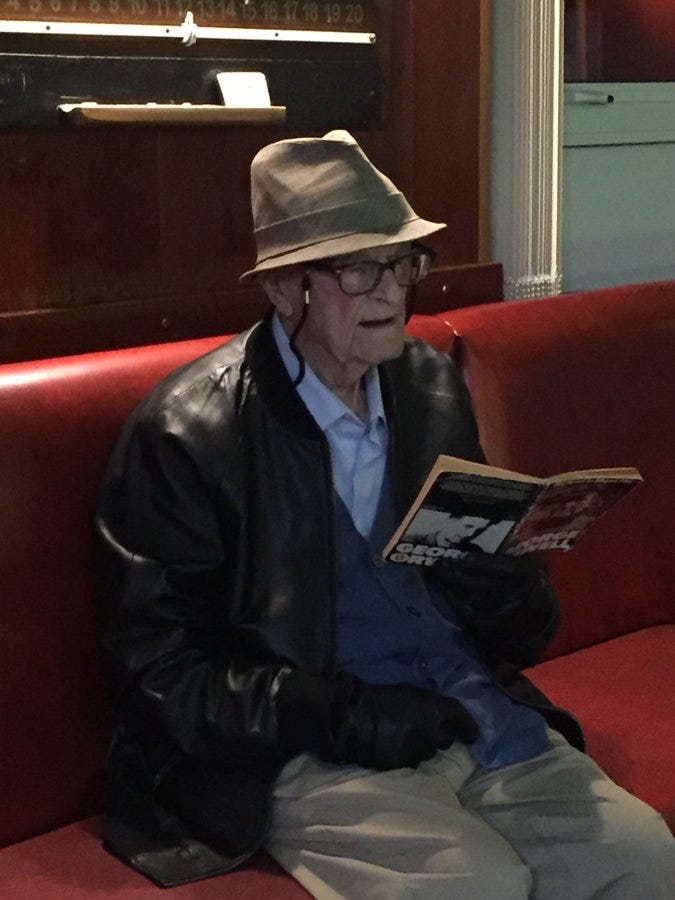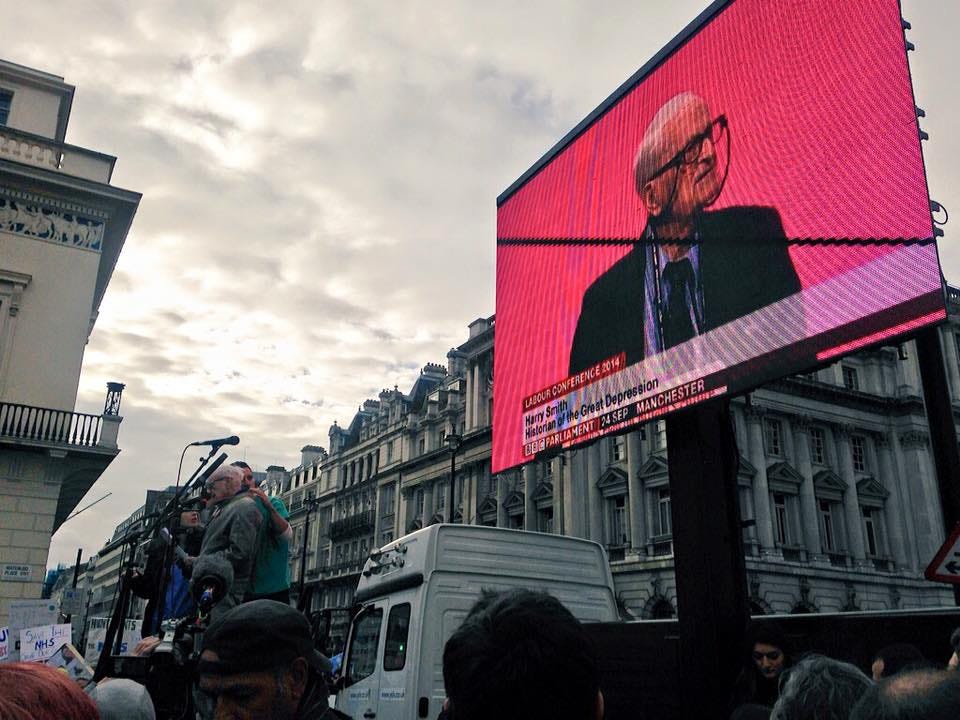"Unbridled capitalism in the 1930s was a one way ticket to fascism."
The whole purpose of my Harry’s Last Stand Substack is to use my life, my father’s, my family and my ancestors as a working-class history of Things Past. It is a testament to the worth, uniqueness and profoundness of the lives of ordinary people who are continuously erased from history. It's why the entitled own our present reality because we have been taught by them our existence is unimportant except as consumers of their mass-produced goods of ephemeral value. During the last ten years of my father’s life 5 books were produced to explore those lives. The Green and Pleasant Land was to be the 6th book but my father died before the work was finished and refined. One of my projects here has been completing the work we did on the Green and Pleasant Land. Below is another excerpt from it.
From 1937 until I volunteered for the RAF, my workday mornings always began at 5:30 AM. At that hour, my mother woke our house like a sergeant major. She banged on pots and screamed. "Wakey, Wakey."
For breakfast, I drank strong tea with milk and sugar because my wages allowed me that simple luxury. To appease my appetite, I smoked half a cigarette for my breakfast. I saved the other half for my walk to Grosvenor's main shop- which was located near Halifax's town centre.
When I arrived at work, my task was to load a barrow with giant blocks of cheese cut from their wheels. Along with the cheese, I loaded the barrow with butter, bacon and shoulders of smoked pork, which needed to be delivered to Grosvenor's other shop at the Arcade on Commercial Street.
It was a beast of burden work, but I did it with youthful enthusiasm. On those mornings, I wielded my freight like an acrobat from road to pavement and back to road. I dodged with alacrity the shop girls, clerks and those with expensive suits who crowded my route.
When I arrived at the arcade, I unloaded my wares. Afterwards, I worked behind the counter and took customers' orders.
For six days a week, I worked 12 to 13 hours per day and believed myself lucky because I remember the long, lean years when my dad was unemployed.
At fourteen years old, whether my life was long or short; a destiny spread out before me as it had spread out before to all those in my family, living and dead. I was to be a pack animal for capitalism. In 1937, it horrified me and depressed me that my class predefined my future in a country whose economy was fueled by capitalism.
It was hard to express openly my opposition to this because, to the people I knew, it was expected and something to be endured. To want more than adequate wages to live a substandard life was considered getting above one's station. Britain's working classes were militant about getting the essentials for life. But they were cowed; when it came to demanding a life with as many pleasant experiences as the middle classes.
Shamed by my past, I developed anger and disgust for my Northern poverty. I despised myself because I believed others thought I sounded uneducated and unsophisticated because of my broad accent.
Actors and actresses on the screen all spoke with the diction of the South or with the voices of Americans. I was determined to forge a path for myself out of poverty. If my country refused to provide me the educational skills to do it, I'd find another way to get ahead.
I couldn't afford to go to school to improve my education. But I could afford the tuition to take elocution lessons at The Athenaeum Working Man’s Academy in Halifax. I was young enough and foolish enough to believe a posh accent would give me the velocity to escape the gravitational pull of my hard scrabble existence.
I thought having a "better" accent; one that didn't sound like it came from Barnsley and the rough streets of Bradford was my best chance to escape the destiny of a working-class lad who lacked family connections to enter a trade.
The Athenaeum was a cooperative learning centre for languages, pronunciation, diction, and self-improvement. The school was established by a collective of utopian cloth cutters in the 1890s to advance education for downtrodden young people.
The classes occurred in the evenings because those who enrolled at the Athenium were full-time workers. There were about nine of us in the class, and all the other students were at least four years older than me.
The other students were children of mill supervisors, greengrocers, or low-level clerks in banking and insurance.
The course consisted of breathing exercises, singing, warbling and endless repetition of phrases. The instructor manhandled my jaw as I repeated nursery rhymes. I was made to repeat the sounds of vowels and consonants while a metronome beat back and forth on the teacher's desk. I spent weeks at it. When alone, I recited poetry, read newspapers out loud or imitated dialogue from movies, I'd seen at the cinema.
I tried to erase how my ancestors and, folk were taught to speak and communicate for centuries. It was this mad and desperate hope that by altering the pattern of my speech I could erase the shame of eating from rubbish bins to keep alive as a boy.
Gradually, my speech pattern developed to a more neutral accent, which resembled the ‘neither from here nor there’ county. My workmates at Grosvenor's thought I was taking the piss out of them with my newly developed speech pattern. The owner with his profound reverence for God and self-improvement, applauded my efforts.
As my speaking voice became less my own, I became bolder. I was able to conceal- if only for brief moments, my poor education and my impoverished upbringing.
My sister Alberta found my attempts to erase my identity futile. She called me Icarus because she remembered the ancient myths of Greece our dad taught us when we lived with him in the attic of that Bradford Doss on St Andrew’s Villas.
"The bloody toffs, are going to burn your wings to cinders."
Alberta knew- having been disappointed by life more than me because she was older, that you can change your diction but never your history. You drag around the baggage from your past wherever you end up.
When she turned 17, my sister Alberta moved out. She desired to break free from the despair that clung to everyone who lived under my mother's roof.
During her teenage years, Alberta blamed my mother for our family's destruction. She harboured resentment towards our mother because she saw her as the one who not only exiled my dad to living rough but had made her and me- accessories to this betrayal of our father. So when my sister moved out from under my mother and Bill's roof, she intended that there would be fireworks as she exited the house and what she hoped was my mother’s orbit.
The hour before tea time, on rent days, my mother sat in a rocking chair in our squat parlour and waited for my sister and me to come to her to pay our board.
Normally I paid first, and then Alberta followed. But on the day she moved out, my sister delayed her appearance as she tried to build the courage needed- to confront Mum with the news of her departure.
Mum enquired where my sister was. I pretended I didn't know.
Moments later, Alberta appeared before Mum. She held in her right hand a small bag which contained the little clothing my sister owned.
“What’s this then?” asked my mother suspiciously. “What are you up to?
“Nothing, Mum,”
“Come on then, give me thy wages,” my mother demanded impatiently.
“Can’t, Mum,” Alberta replied defensively, almost meekly.
“Can’t? “Why can’t thee? Why the bloody hell can’t thee?” Mum said with rising anger.
“I am moving out,” Alberta said defiantly.
My mother rose from her chair. She lurched forward and stood within inches of my sister. She raised her right finger and wagged it as she ranted.
“Like hell you are… How dare you move out.”
I can do what I want. And there’s no one to stop me.
“You ungrateful bitch, screamed my mother.
Me, ungrateful? Since I was four, I have been working like a fucking dog, for you. I was always by your side cleaning, cooking, or stealing food for our tea when Dad was let go from the pits. I was there for you even after you chucked our dad out on his ear and took up with Bill. I stood up for you when Bill tried to beat you after he came home pissed from the pub.
It’s always, dependable bloody Alberta that's been by your side, I’ve had no bloody life because of you. I’ve gone to bed cold and fucking hungry because of you. I tended to Harry and Matt because you were not fit to help. Look at you now with another wee bugger on your tit.
You know nowt about what I’ve done for thee. “Without me, you’d be in the workhouse or the streets.
Your dad, with his high ‘n mighty family; was no bloody help to me or you. Did any of them raise a finger when we were starving?
I’ve got blood on my hands, lass, from scraping and fighting for food for you and your bloody brothers. And now you come to me and say here’s the thanks; I am moving out. Mark me, Alberta, life will soon have you sorted- well and good.
“Good bloody luck; cause you’re going to need it; nowt is coming your way but misery. Bugger off then, leave your bloody mother, and leave your bloody brothers and good riddance to thee.”
Alberta looked at me and said with a weary smile,
Never mind, Harry When you’re ready, you can come live with me. Take care of yourself because Mam will be no bloody help to you.
.
After Alberta left my mother returned to her chair and rocked angrily back and forth whilst nearby Bill Junior wailed from hunger.
When Bill returned home from work that night, we dipped fried bread into fried eggs for our tea and ate without conversation.
Hi All:
Thanks for reading my Substack. You have been great all this year and my subscription numbers have grown. I do really need your help during this end of the year, if you are able. I am rent short and want to remained housed and continuing to sustain and grow the legacy of my dad and his Last Stand Project. I think it is worthwhile and necessary. I am looking for 4 new yearly subscribers to keep the lights on. It’s 30 quid a year or $50 and I think it has value. Substack and the payment platform take around 20% of that because capitalism is the gift that keeps giving to the wealthy. So if you can thanks and if you can’t it’s all good because you in solidarity with the work and projects ahead. There is also a tip jar for those inclined.
Take care, John



Yes, and here we are again, having learned nothing at all.